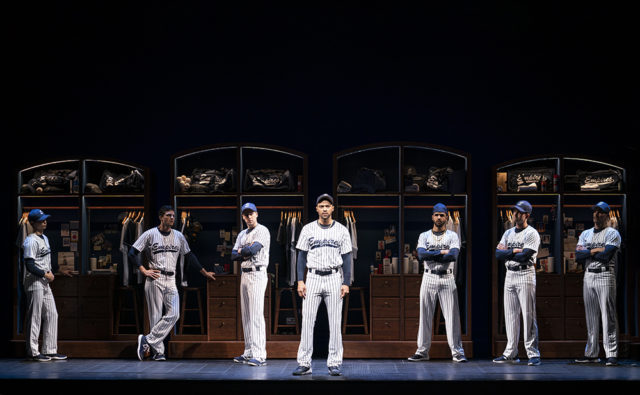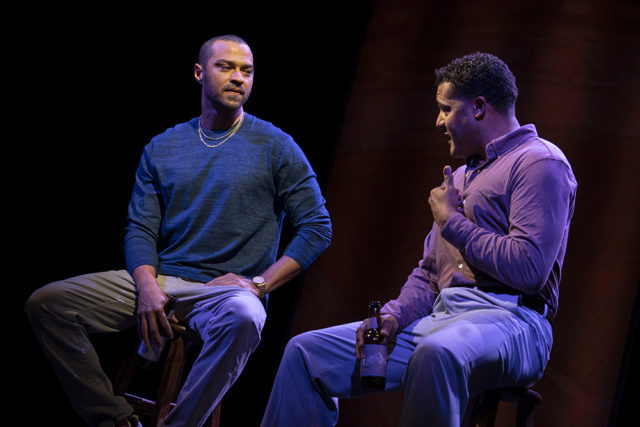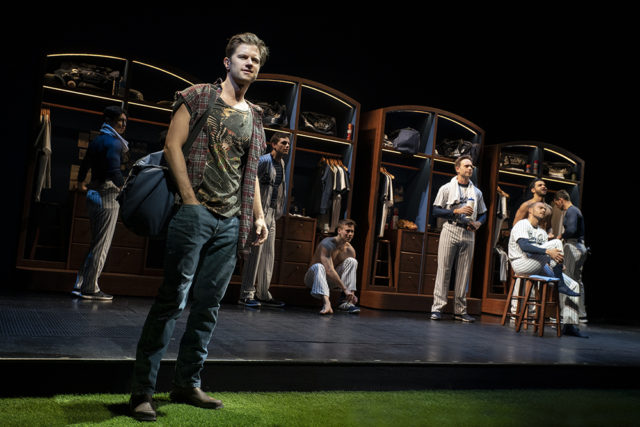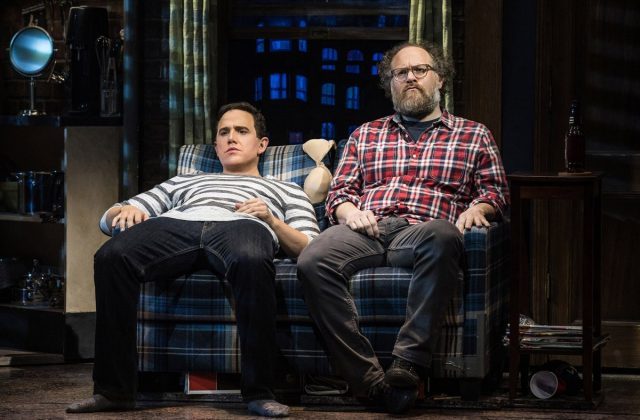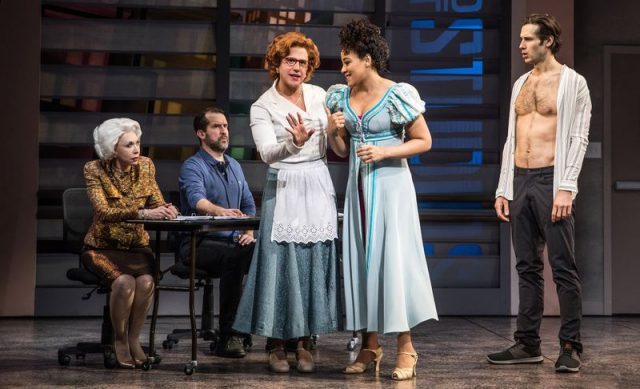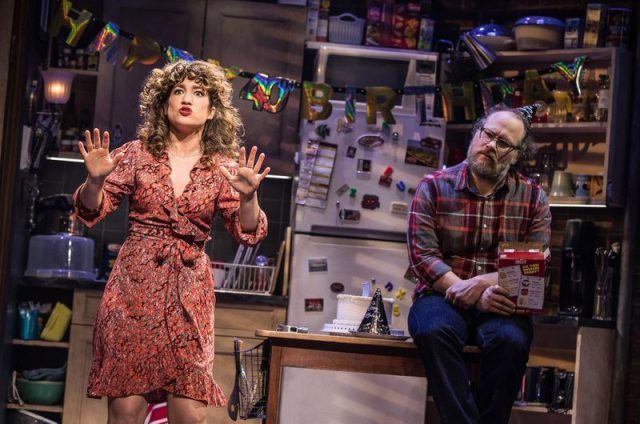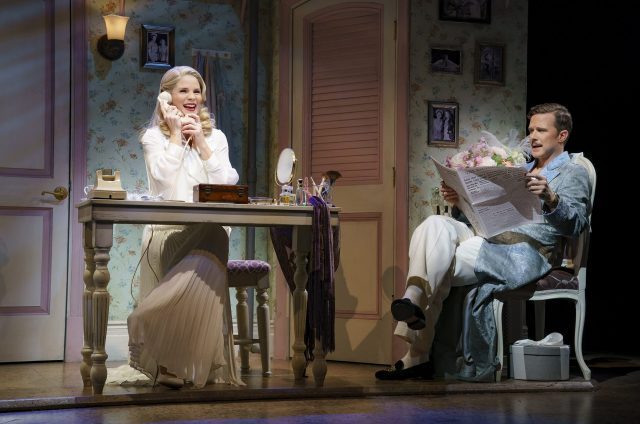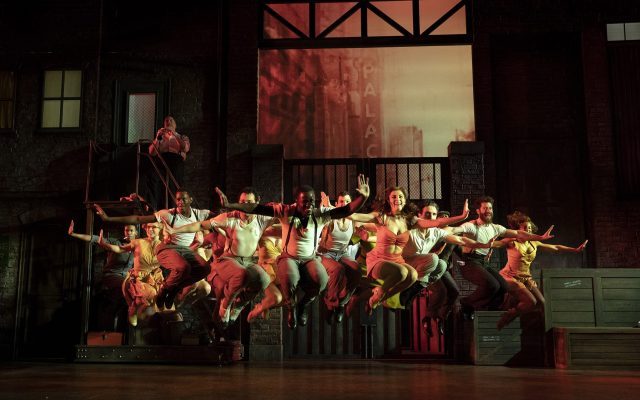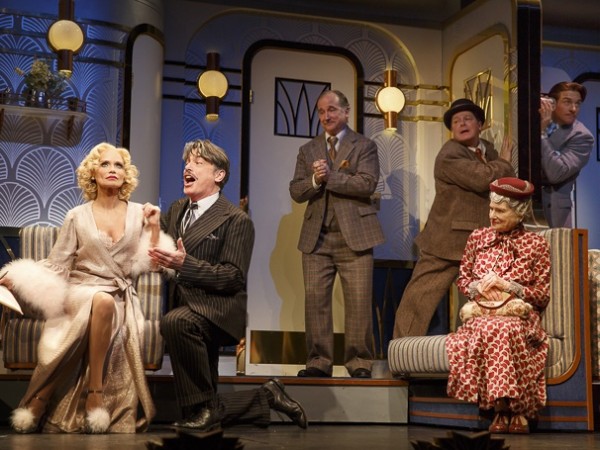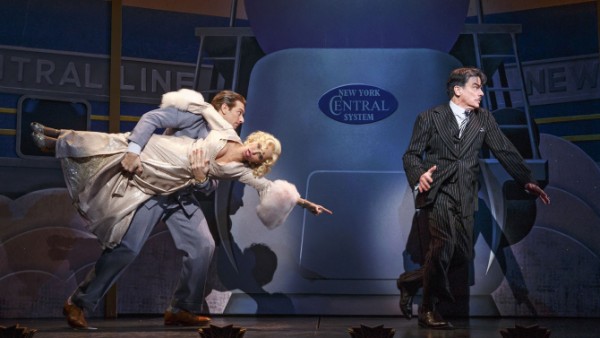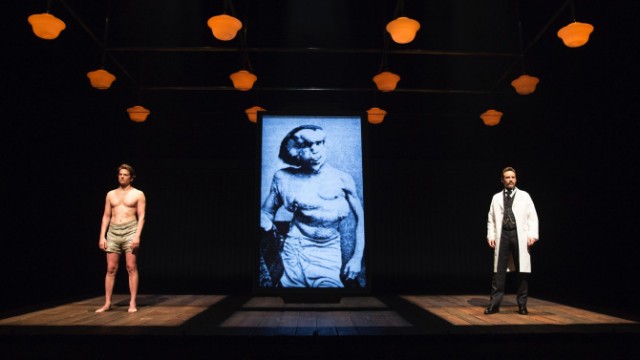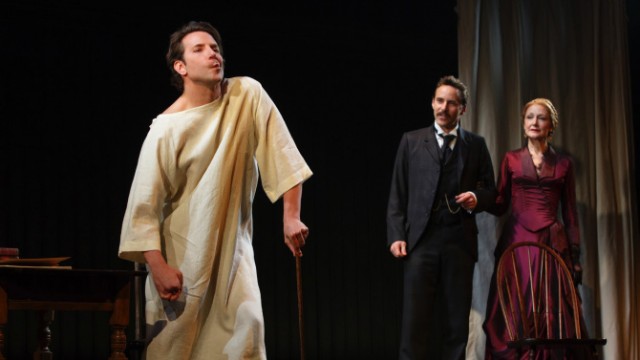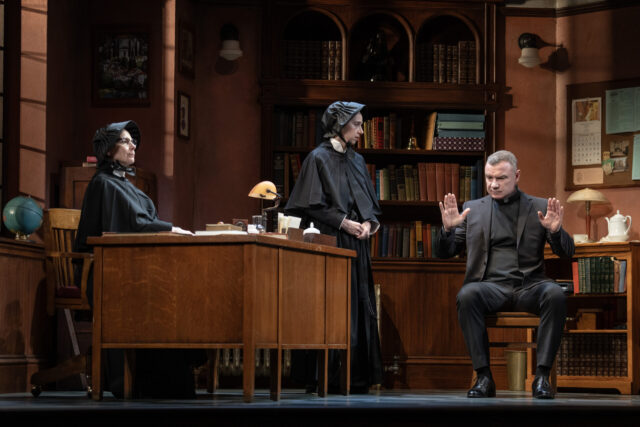
Sister Aloysius (Amy Ryan), Sister James (Zoe Kazan), and Father Flynn (Liev Schreiber) have a serious talk in Doubt (photo by Joan Marcus)
DOUBT: A PARABLE
Todd Haimes Theatre
227 West Forty-Second St. between Broadway & Eighth Ave.
Tuesday – Sunday through April 14, $68-$344
212-539-8500
www.roundabouttheatre.org
“What do you do when you’re not sure? That’s the topic of my sermon today. You look for God’s direction and can’t find it,” Father Flynn (Liev Schreiber) says at the beginning of the first Broadway revival of John Patrick Shanley’s 2004 Pulitzer- and Tony-winning Doubt: A Parable. “Doubt can be a bond as powerful and sustaining as certainty. When you are lost, you are not alone.”
Shanley has two plays running concurrently in New York City, both dealing with doubt and certainty. Roundabout’s production of Doubt has been extended at the Todd Haimes Theatre through April 21, while Manhattan Theatre Club’s world premiere of Brooklyn Laundry has been extended at City Center through April 14. (A sold-out revival of Shanley’s 1983 two-character Danny and the Deep Blue Sea, starring Christopher Abbott and Aubrey Plaza, completed a limited run at the Lucille Lortel in January; it covered some of the same themes as the other two.)
Doubt and Brooklyn Laundry both feature four characters, rotating sets, high-powered performances, real-life inspiration, and, with just a few exceptions, a series of scenes between two characters. But while the former flows seamlessly as the plot unfolds, the latter is bumpy and much less structured.
Doubt takes place in St. Nicholas Church in the Bronx in 1964, during the Second Vatican Council, which sought to update Catholicism in response to the modern world, moving away from scholasticism and centuries-old doctrine and theology toward new ways of relating to lay people, priests, and nuns. Not everyone was on board, and some still aren’t sixty years later.
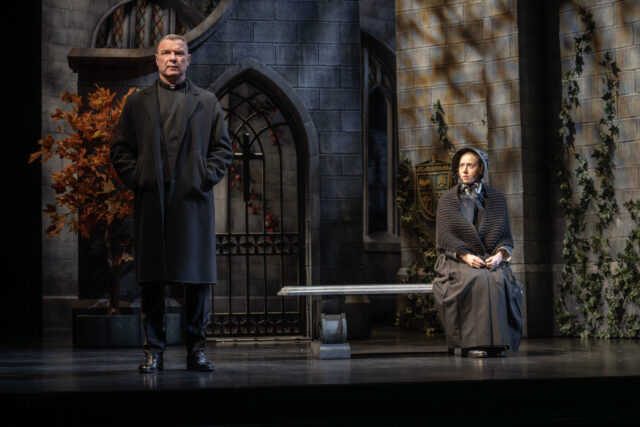
Father Flynn (Liev Schreiber) shares a moment with Sister James (Zoe Kazan) in the church garden (photo by Joan Marcus)
The school is run by the hard-nosed, impossibly strict principal Sister Aloysius (Amy Ryan), a member of the Sisters of Charity, who has no time for art, music, dancing, ballpoint pens, Frosty the Snowman, Father Flynn’s long fingernails, or the monsignor, who she thinks is oblivious. She believes that “satisfaction is a vice” and “innocence is a form of laziness.” When young teacher Sister James (Zoe Kazan) stops by her office, Sister Aloysius starts drilling her on classroom methods, claiming she’s too lenient with her students. She wants her to pay more attention but won’t say exactly what Sister James should be looking for. “I must be careful not to create something by saying it. I can only say I am concerned, perhaps needlessly, about matters in St. Nicholas School,” the older nun says with suspicion.
Later, in the church garden, Sister Aloysius asks about Donald Muller, the first Black student in the school; she is sure that Donald, an altar boy, will get bullied, but when Sister James points out that Father Flynn has taken him under his wing, Sister Aloysius immediately tightens up. “So it’s happened,” she says, as if she has been waiting for this moment.
She learns that Father Flynn had a private talk with Donald in the rectory. Later, in her office, she demands that Father Flynn tell her what happened. The priest refuses, arguing that it was a sensitive, personal matter while understanding exactly what the principal is accusing him of without her saying it out loud. When he is eventually forced to talk about it, he explains that he was only protecting the child and did nothing wrong. That’s not enough for Sister Aloysius, who still suspects him; he storms out, and she tells Sister James, who believes the father, “These types of people are clever. They’re not so easily undone. . . . I’ll bring him down. With or without your help.”
What follows is a tense cat-and-mouse game between the principal and the priest; Sister Aloysius even calls in Donald’s mother (Quincy Tyler Bernstine), who shocks her with her response to learning that her son might be in danger from a predatory priest.
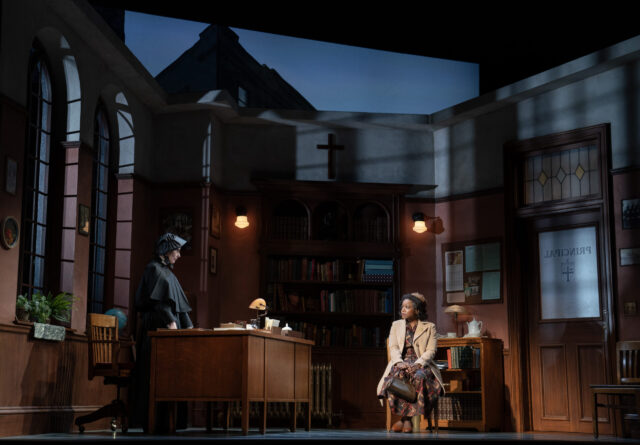
Sister Aloysius (Amy Ryan) has some harsh words for Mrs. Muller (Quincy Tyler Bernstine) in Broadway revival of Doubt (photo by Joan Marcus)
Doubt debuted on Broadway in 2004, with Brían F. O’Byrne as Father Flynn, Cherry Jones as Sister Aloysius, Heather Goldenhersh as Sister James, and Adriane Lenox as Mrs. Muller; all four cast members received Tony nominations, with Jones and Lenox winning, along with awards for Best Play and Best Director (Doug Hughes). In 2008, Shanley adapted the play into a feature film, with Philip Seymour Hoffman as Father Flynn, Meryl Streep as Sister Aloysius, Amy Adams as Sister James, and Viola Davis as Mrs. Muller, all of whom were nominated for Oscars, along with Shanley’s adapted screenplay, which expanded the story to include more than fifty roles.
Director Scott Ellis (Take Me Out, The Assembled Parties) masterfully directs the ninety-minute play, never letting the tension break as the audience wonders whether Father Flynn actually abused Donald. The story was partly inspired by Shanley learning years later that his high school mentor was a sexual predator, as well as his deep respect for nuns. Except for one scene between the two sisters and the father, all the others feature two characters talking about intolerance, faith, gossip, love, God, and what, or who, to believe.
David Rockwell’s sets move between Sister Aloysius’s austere office and the garden, with a projection in the back of buildings next to the church. Everything disappears and windows drop from above when Father Flynn delivers his homilies. Linda Cho’s costumes are primarily dark habits and vestments. Kenneth Posner’s lighting and Mikaal Sulaiman’s sound maintain the eery, mysterious feeling of impending doom.
Bernstine (The Amateurs, Our Lady of 121st Street) is powerful as Mrs. Muller, who is not afraid to make her unique point of view known, and Kazan (Love, Love, Love; A Behanding in Spokane) is wonderful as the doe-eyed innocent who is in over her head.
Two-time Tony nominee Ryan (Love, Love, Love; A Streetcar Named Desire) is almost unrecognizable as Sister Aloysius, the cagey principal who trusts no one except God. She portrays her as diamond-hard, a cold, steely woman without kindness or compassion but she’s not quite a villain, although you’d have to look hard to find a soft spot; you hope she is wrong about Father Flynn not only because he is a more relatable person but because you want her not to win. (Or do you?) Schreiber (Les Liaisons Dangereuses, A View from the Bridge) is utterly brilliant as her prey, his eyes mesmerizing, his gestures works of art; he is almost otherworldly when giving his sermons, then down to earth when teaching the boys basketball.
“Now, the thing about shooting from the foul line: It’s psychological,” Father Flynn explains. “The rest of the game you’re cooperating with your teammates, you’re competing against the other team. But at the foul line, it’s you against yourself. And the danger is: You start to think.”
He’s talking about a lot more than basketball.
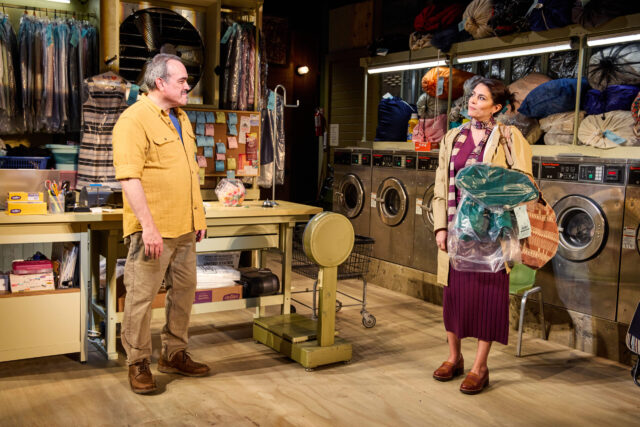
Owen (David Zayas) and Fran (Cecily Strong) take stock of their lives in Brooklyn Laundry (photo by Jeremy Daniel)
BROOKLYN LAUNDRY
Manhattan Theatre Club
MTC at New York City Center – Stage I
Tuesday – Sunday through April 14, $119-$129
212-581-1212
www.manhattantheatreclub.com
“You believe in God?” Fran Costello (Cecily Strong) asks Owen (David Zayas) shortly after meeting him.
“Yeah, why not? You want your dry cleaning?” he responds.
Inspired by having his clothes lost by a local laundromat, John Patrick Shanley’s Brooklyn Laundry is a slight but enjoyable seventy-five-minute trip into a quartet of people facing turning points in their lives. Fran is a cynical thirty-seven-year-old office worker, the youngest of three siblings; her sister Trish (Florencia Lozano) lives in a hospice trailer in Pennsylvania with her two young kids, her ex-husband in jail; her sister Susie (Andrea Syglowski), who lives with her husband and their six-year-old son in the city, is the responsible one; and the fiftyish Owen owns three laundries and hasn’t been with a woman since his fiancée left him two years before.
It’s not exactly love at first sight for Fran and Owen when she comes in to drop off a bag of laundry, where she has a credit because they lost her laundry six months ago. “You’re like my fiancée was,” he says. “She’s . . . ?” Fran begins. “Gone. She was like you. Smart, one inch from terrific, but gloomy,” he continues. She answers, “I don’t think I’m gloomy. I think what I’m suffering from is reality.” Owen: “Some folks look life in the mouth.” Fran: “You’re not one of those people who think I’m manifesting, are you?”
He asks her on a date, and she reluctantly agrees. “Why would you want to have dinner with a person who’s in the middle of an episode?” she asks. He responds, “I don’t know. Everybody has a bad day.”
Fran goes out with Owen and meets up with Trish in Pennsylvania and Susie in Brooklyn as she takes stock of her sad, lonely life; her problems are not about to just come out in the wash.
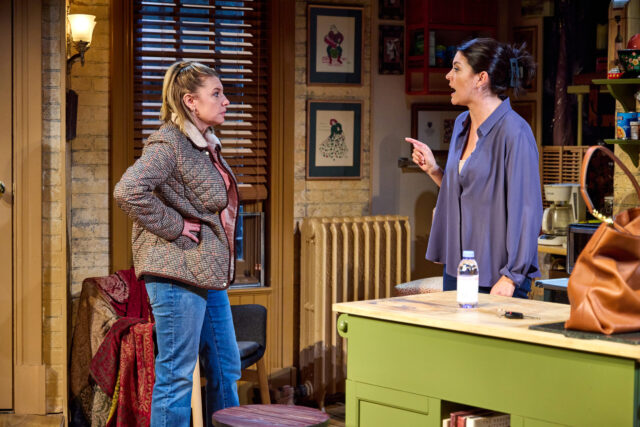
Susie (Andrea Syglowski) and Fran (Cecily Strong) have a family squabble in John Patrick Shanley world premiere for MTC (photo by Jeremy Daniel)
The concept of sleep is an underlying theme of the play. At one point, Susie says to Fran, “It’s a wake-up call,” and Fran responds, “Was I asleep?” Sleep is brought up by all four characters, which harkens back to Doubt. “Oh. I can’t sleep,” Sister Aloysius tells Father Flynn, who asks, “Why not?” The nun says, “Bad dreams. Actually one bad dream and then I haven’t slept right since.” Later, she says to Sister James, “Maybe we’re not supposed to sleep so well.”
Santo Loquasto’s set rotates from Owen’s laundry, which appears to be fully operational, chugging away as the audience enters, to the bedroom in Trish’s trailer, Fran’s studio apartment, and the restaurant where Fran and Owen go to dinner. Suzy Benzinger’s costumes are naturalistic, Brian MacDevitt’s lighting is sharp, particularly in the dinner scene, and John Gromada’s original music and sound maintain the mood, along with Lil Nas X’s “Old Town Road.”
All four actors are exceptional; Lozano (Placebo, One Wet Brain) imbues the dying Trish with a keen sense of humor, Syglowski (Dig, Halfway Bitches Go Straight to Heaven) brings humanity to the angry and frustrated Susie, Strong (The Search for Signs of Intelligent Life in the Universe, Schmigadoon!) empowers Fran through all her awkwardness, and Zayas (Cost of Living, Anna in the Tropics) proves once again why he’s one of the best around, portraying the unpredictable and frightfully honest Owen with charm to spare.
Written and directed by Oscar, Tony, and Obie winner and Emmy nominee Shanley (Outside Mullingar, Prodigal Son), Brooklyn Laundry contains unexpected dialogue with clever undertones. When Owen tells Fran she can keep a quarter that fell on the floor, she says she doesn’t want it, so he asks, “What? You afraid of a little change?” Trish loves the artificial flowers she’s had for twenty years. “You can wash them. They never fade,” she says, as opposed to clothing, or people. When Owen and Fran are at dinner, she is upset that chicken is not on the menu, so he urges her, “This is exactly when reality becomes super important. You must choose from what exists on the menu, Fran, and not choose the invisible thing in your mind.”
However, each scene seems to exist in its own mind; they never come together as a whole, unfolding like loosely connected stories with chapters missing.
“What do you do when you’re not sure?” Father Flynn asks in Doubt, a nearly perfectly executed drama. Meanwhile, Brooklyn Laundry feels unsure of itself, unable to sleep well.
[Mark Rifkin is a Brooklyn-born, Manhattan-based writer and editor; you can follow him on Substack here.]
